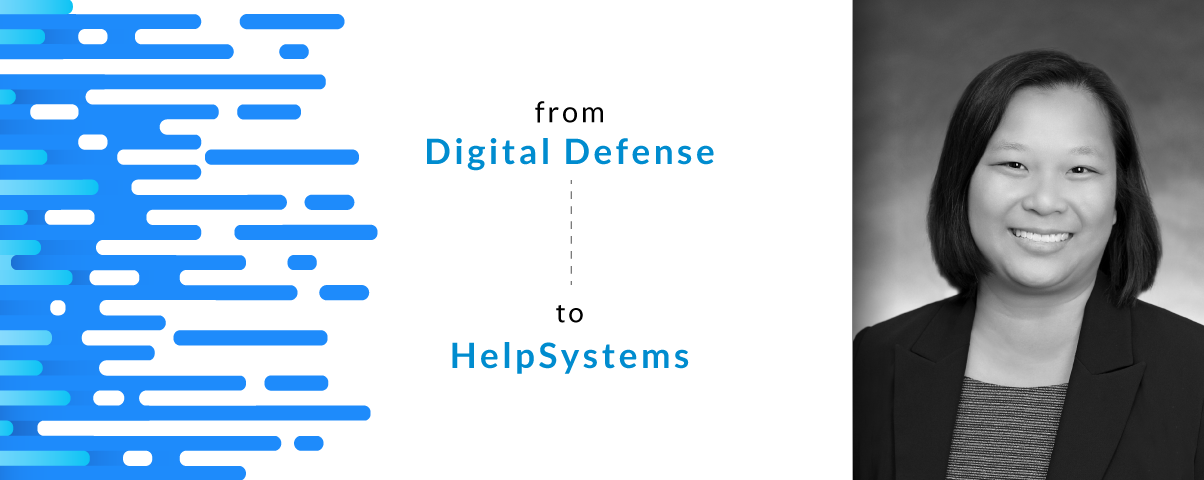
After Fortra acquired Digital Defense in 2021, Mieng Lim found she could hone her focus on helping customers improve their vulnerability management capabilities. A year and a half later, the leader of product management for the Fortra infrastructure protection portfolio has embraced remote work and the continuation of the family-like culture she enjoyed for 20 years at Digital Defense.
History of Digital Defense
Founded in San Antonio in 2001, Digital Defense began by installing computer networks. They soon shifted gears to focus on cybersecurity after a credit union asked for help adhering to NCUA compliance. Thus began a successful new path that continued to build on the company’s deep roots in the finance sector.
“Our focus is on vulnerability management and penetration testing services,” Mieng says. “We have an industry-leading offering that makes vulnerability management easier and more accessible. That's really our goal. A lot of tools in the market require expertise, and we want to make it easy for organizations with limited resources or limited security expertise to gain insight into their networks and understand what they need to fix and help streamline operations for larger enterprises.”
Fortra Takes Note
“Digital Defense is one of the few proprietary vulnerability management scanners remaining in the market,” Mieng recalls. “Maintaining a vulnerability scanner is not an easy job. It requires a lot of skilled individuals. We have a great intuitive platform that is very well received. We also have —and maintain—a very high customer retention and Net Promoter Score."
Fortra recognized the strength of the business and acquired Digital Defense in February 2021 as a cornerstone of its infrastructure protection strategy. “The acquisition itself went relatively smoothly,” she says. “We were already a fairly streamlined organization of very driven individuals and were producing product releases and updates regularly.”
Fortra Provides a Boost in the Market
Over the years, Digital Defense grew mostly via word of mouth and referrals. Although the company was consistently profitable, its sales reach was limited. “One of the challenges was having that sales engine to get the exposure for our brand and product, and what we could do for organizations,” Mieng says. “That's one of the things being part of Fortra has assisted us with so much: being able to utilize its global presence and global sales engine.”
Big Benefits: Focus and Productivity
“I think the biggest benefit of the acquisition was that we no longer have to be everything to our customers for every aspect of cybersecurity,” she says. “Being part of the Fortra family means we now have a large portfolio to refer to when a customer has specific needs.”
Previously, Mieng felt a huge weight on her shoulders as the head of product management, constantly having to develop new offerings several times each year. “What's been great about my journey so far at Fortra is that product management leadership has given me an opportunity to really focus on what my team is doing and improve on everything affiliated with the infrastructure protection products. I now have more time to focus on the customer.”
A Wide-Ranging Career Journey and New Opportunities
In her two decades with Digital Defense, Mieng has worn many hats—from sales to QA to product marketing and more—increasing her leadership acumen with every step. After the acquisition she was offered the chance to expand her role.
“I was presented with the opportunity to take on the product management function for a sister brand, Beyond Security, when they were acquired a few months after Digital Defense,” she says. “It was exciting to dig in and learn more about a new product that was in our space, one we hadn't encountered very often, and then help to evolve that product as well.”
Today she leads product management for the entire infrastructure protection portfolio, driving strategy and planning for Beyond Security, Digital Defense, Core Security, and Cobalt Strike. A number of her team members have acquired new roles and responsibilities within Fortra as well.
“There are many, many opportunities for our team to grow personally and in terms of their career paths,” Mieng says.
An Expanded Family Culture
“‘Family’ is the word that comes to mind when I think about the Digital Defense culture,” she says. “We were an organization of about a hundred people, and I knew every single one of them.”
Fortunately, her first call with the team at Fortra led her to realize not much would change. “We were a very good fit for the culture at Fortra and shared the same core values of being helpful and pursuing excellence.”
Remote Work and Self-Sufficiency
For Mieng, the biggest change has been the remote work due to the pandemic. “I occasionally miss people, but Fortra has done a tremendous job embracing the remote work culture and fostering events and ways for employees to interact,” she says. “We have a leadership team that understands the landscape and is helping employees to adapt while adapting the organization as well.”
Mieng believes the Fortra remote and hybrid work structure gives team members the ability to balance work and life. “There's that element of self-sufficiency, of being able to take care of things and not be micromanaged,” she says. “The flexible work hours and flexible Fridays have been fantastic. The working structure, all those components combine to make it a place you want to work because you have freedom to perform in the way that best fits you and allows you to excel.”